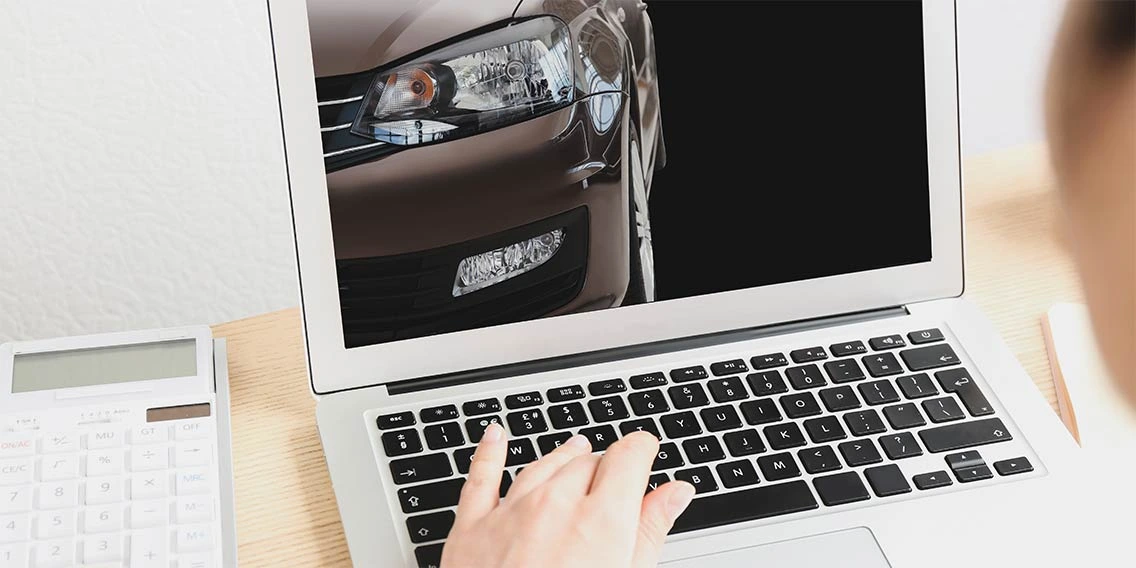AUTO
Should I Lease or Buy a New Car?
EXPECTED READ TIME: 11 MINUTES
Deciding between new or used is usually the first big choice you face when shopping for a car or truck, but the choice to lease rather than buy — or vice versa — can actually have a dramatic impact on your lifestyle and finances for years to come. Given the potential implications, you certainly owe it to yourself to look at the benefits and drawbacks of leasing vs. purchasing a new vehicle.
What is a Vehicle Lease?
A vehicle lease is a contractual agreement between you and an auto dealer that allows you to pay for the use of a car or truck for an extended period without buying it. The contract outlines terms and conditions of your lease, including your monthly payment amounts, length of the lease, restrictions, additional fees, and other information.
How Does Leasing a Vehicle Work?
The process of leasing a vehicle is a lot like buying one. You'll need to visit a dealership, search for a car or truck you like, take a test drive, and ask questions.
You'll also negotiate payment terms, have your credit checked, and sign countless documents before making a down payment and committing to monthly payments.
The key difference? When you lease a vehicle, you're essentially renting it for a fixed amount of time and a set number of miles rather than paying to eventually own it. That's why, with a lease, you pay only for the depreciation between the agreed-upon price and the value of the car or truck at the end of the lease (plus interest, taxes, and fees).
For example, if you lease a $30,000 new vehicle and the dealer estimates that it will be worth $18,000 in three years, you'll pay $333.33 each month to cover the $12,000 depreciation.
You can expect lease agreements to last anywhere from 36 to 48 months. Once the lease contract expires, you have three options:
- Return the vehicle to the dealer
- Purchase the vehicle
- Lease or buy another vehicle
What Are the Advantages and Disadvantages of Leasing a Vehicle?
Leasing is the way to go if you like to drive off the lot in a shiny new car or truck every few years, but there's a little more to it than you might think.
Advantages of a Car Lease
Less Money Down
The down payment required to lease a vehicle is typically less than what's needed for a new car loan. On most lease deals, the down payment ranges from $0 to $3,000.
Lower Monthly Payments
If you're tight on money each month, you may not have to sacrifice as much to drive a nice car. The average lease payment for a new vehicle is $467 per month, compared to $568 for the typical monthly auto loan payment.
Potential Sales Tax Savings
Depending on tax laws where you live, you may only be required to pay sales tax on your down payment, plus the total of the contract's monthly payments, rather than paying tax on the vehicle's total market value.
Warranty Protection
Most lease vehicles come with factory warranties that last the life of a typical lease, so you won't have to pay for any major repairs that might be needed. In fact, your only maintenance costs will be routine procedures like changing the oil, rotating the tires, and other recommended upkeep.
More Convenient
When a lease ends, you don't have to hassle with selling your vehicle or worry about its trade-in value. Simply return the car to the dealership where you got it, pay any remaining fees, and sign some paperwork.
Routine Upgrades
One of the biggest benefits of leasing a vehicle is the ability to upgrade to a newer model every few years. This means you'll always be riding in a car or truck equipped with the latest safety and convenience features.
Disadvantages of a Car Lease
No Equity or Trade-in
Much like renting an apartment instead of buying a house, you don't build equity when you lease a vehicle. So, when your lease is up, you won't be able to trade in your vehicle or sell it for a down payment on your next car or truck.
Mileage Restrictions
Vehicle leases typically restrict you to between 12,000 and 15,000 miles each year. If you exceed the mileage outlined in your contract, you'll be charged a penalty of roughly 15 cents (sometimes up to 30 cents) for each mile you drive above the limit.
Higher Insurance Rates
When you lease, your insurance policy must cover the amount that's still owed on the lease in case the car is totaled.
Upfront and Post-lease Fees
With a lease, you typically pay a variety of fees at the beginning and end of your contract, including an acquisition fee, documentation or "doc" fee, and disposition fee.
| Automobile Leasing Fees | |
|---|---|
| Acquisition Fee | This fee is charged by a bank on every vehicle lease. It's often rolled into your down payment. |
| Documentation (Doc) Fee | The doc fee pays for the cost of doing paperwork. It can add a few hundred dollars to your upfront lease costs. |
| Disposition Fee | This charge — roughly equivalent to one month's payment — is added at the end of a lease to help the dealer cover the costs of selling the vehicle. |
Early Termination Penalty
If you end your lease before the contract expires, the lease company will likely charge an early termination fee. The penalty can vary based on the terms of your contract, but it typically includes the remaining balance owed on the lease and the credit you receive for the current value of the car.
No Customization
Leases require you to return the vehicle in relatively the same condition as when you signed the contract. This means you can't customize the car or truck with accessories, paint jobs, or other modifications that can't be removed or restored to the original condition.
| Pros of Leasing | Cons of Leasing |
|---|---|
| New car every few years | No equity or trade-in value when lease ends |
| Less (or no) down payment | Higher insurance rates |
| Lower monthly payments | Fees due at the beginning and end of lease |
| Repairs typically covered by warranty | Mileage restrictions |
| Potential sales tax savings | Penalty for terminating lease early |
| No selling involved | No customization |
Advantages and Disadvantages of Buying a Vehicle
Purchasing is ideal if you want to wring maximum long-term value out of your investment. Consider the following benefits of owning your car or truck outright.
Advantages of a Car Loan
Eventual Ownership
The biggest boon to buying a vehicle is owning something of value when you finish paying it off. Then you're free to sell it, trade it in, or keep and maintain it — the choice is yours.
Limitless Mileage
When you purchase a vehicle, you can drive it as often you like without worrying about extra fees for exceeding a mileage limit.
No End-of-Contract Fees
All you have to do is make your last monthly payment — that's it. Some lenders don't even charge prepayment penalties if you pay off your loan early.
Freedom to Sell or Trade
When you buy, you're free to sell or trade in your vehicle at any point — even before you've paid it off. Just keep in mind you may have to use some or all of the money from the sale to pay off the balance of your loan.
No Wear-and-Tear Charges
Purchasing rather than leasing allows you to treat the vehicle any way you like. Drive it hard or pamper it with kid gloves. Plus, you can modify and customize your car or truck to your heart's content.
Disadvantages of a Car Loan
Higher Monthly Payments
In most cases, it costs more each month to finance a vehicle than to lease one because you're paying the principle of the loan as well as interest charges. On average, monthly car payments run $100 more than lease payments.
Larger Down Payment
To get a low monthly payment, you'll need to put down a larger amount on an auto loan than for a lease agreement. And while a larger down payment may reduce interest charges over the life of the loan and help you avoid owing more on your vehicle than it's worth, you just might not have that kind of money up front.
Maintenance Costs
When you buy a vehicle, you're responsible for all maintenance costs — large and small — once the warranty expires (leases typically come with warranty coverage that insulates you from major repair expenses for the life of the contract).
Long-term Commitment
Unless you've chosen a short-term loan and plan to trade in as soon as you've paid off your vehicle, you'll be driving the same set of wheels longer than people who lease their cars. That means you could be stuck with older features and accessories instead of playing with the latest bells and whistles.
| Pros of Buying | Cons of Buying |
|---|---|
| Eventual ownership | Higher monthly payments |
| No mileage limits | Requires larger down payment |
| No additional payments at the end of a loan | Responsible for maintenance costs |
| Can sell vehicle at any point | Long-term commitment |
| No loan penalties for excessive wear and tear |
Comparing the Cost
Generally, you pay less each month to lease a vehicle than to finance one because lease payments are based on the vehicle's depreciation rather than its purchase price. What can be a little less clear, however, is comparing the total cost of leasing versus buying. Here's how to estimate the monthly rate and total cost for a vehicle leasing vs. buying.
Total Cost of Leasing
With most leases, you can get an idea of the total cost by subtracting 1 from the number of months in the lease term and multiplying that number by the monthly payment. Then add that result to the amount due when you sign the lease. (You'll subtract 1 from the number of months in the lease term because the first payment is typically included in the amount due at signing.)
Example
Suppose a dealer is offering a lease deal of $349 per month for 36 months with $2,400 due at signing. Multiply $349 by 35 months, and then add $2,400. The estimated total cost of the lease would be $14,615 (this total does not include fees or any additional charges or penalties specified in the contract).
Total Cost of Buying
When you purchase a vehicle using cash, the total cost is whatever price you're able to negotiate. If you finance your car or truck, however, you must factor interest (unless you secure a 0% interest deal), length of the loan, and down payment into your cost calculation.
Example
Say you negotiate a sale price of $30,000 for a new vehicle and you're able to secure a 60-month loan at 1.99% APR. If you put $3,000 down, you'd be financing $27,000 over five years. Your loan payments would run $473 monthly, bringing your total loan cost to $28,388.
Lease or Buy: 3 Factors to Consider
When it comes to leasing vs. buying, it's a good idea to get familiar with interest rates and trim packages, but don't forget to keep an eye on the big picture, too.
Your Budget
Before signing a loan or lease agreement, determine how much you can afford. A good rule of thumb is to not spend more than 15% of your pretax monthly income on the total monthly cost to own or lease the vehicle. Remember to account for insurance premiums, registration, gas, maintenance costs, and any additional expenses as part of your monthly total.
Your Lifestyle
Check your average mileage. If you anticipate driving your new vehicle more than 15,000 miles annually, leasing probably isn't the best choice. The penalties for exceeding mileage limits could potentially add hundreds or even thousands of dollars to the total cost of your lease.
The same principle applies if you tend to be rough on vehicles. Returning a leased car or truck in poor condition —whether on the interior, exterior, or both — can trigger additional charges.
Your Long-term Plans
If you find a vehicle that you really like and you can envision driving it for years, buying is your best bet. Purchasing an automobile and holding onto it for as long as possible generally proves cheaper in the long run than leasing.
On the other hand, if you like to live in the moment and prefer to not be stuck with a particular vehicle, leasing could be right for you. The money you save on upfront costs and monthly payments, as well as the ability to drive a new model every few years, may be a fair trade-off for not truly owning your car or truck.
Bottom Line
In the end, the best choice is still always going to be the one that won't keep you up at night worrying about how you'll make payments. So do your research, weigh the pros and cons, and then select the approach that fits your style as well as your finances.
Discover Your Car Loan Options
See the rates, benefits, and protection options available through PenFed.




